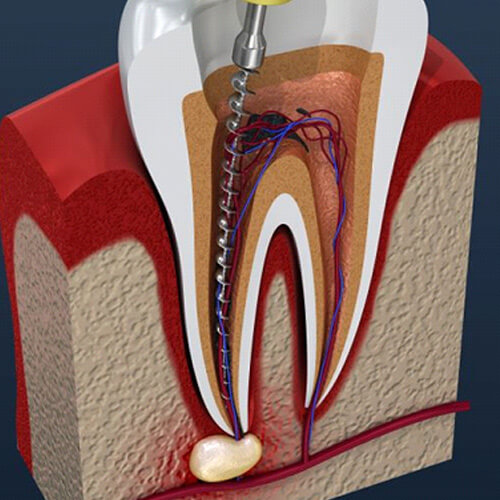Root Canal Therapy – Norton, MA
Put an End to Toothache Pain
Intense, throbbing tooth pain can interfere with your life and make you miserable. The good news is that the team at Norton Family Dentistry offers a number of effective restorative treatments, including root canal therapy. This service has the potential to put an end to your toothache pain, spare you from the need for an extraction, and restore the function and strength of your damaged tooth. Get in touch with us today if you believe you might be able to benefit from this service.
Why Choose Norton Family Dentistry for Root Canal Therapy?
- Empathetic & Skilled Dental Team
- Renew the Function of a Damaged Tooth
- Dental Insurance Welcomed & Maximized
Do I Need Root Canal Therapy?

Root canal therapy is often necessary when decay or physical trauma to a tooth allows an infection to develop in its innermost layer, known as the pulp.
Here are some symptoms that often indicate the need for this treatment:
- You have a throbbing, severe toothache.
- Your tooth is very sensitive to hot and cold temperatures, and the discomfort lingers even after the source of the temperature change is removed.
- A tooth is a different color than the ones around it.
- There is a pimple-like bump on the gums.
In some cases, root canal treatment is necessary even if no obvious symptoms are present. That is why regular checkups are so important!
The Root Canal Process

One of the first things we do during a root canal appointment is administer local anesthesia. This numbs your mouth so you will feel very little during your treatment.
The root canal procedure itself is fairly straightforward. We use special instruments to access the interior of your tooth. Then, we clean out the infected tissue and remove the nerve inside the tooth that was sending pain signals to the brain. We fill in the tooth with an inert material known as gutta-percha. Often, we must place a temporary crown over a treated tooth. Later, the temporary crown should be replaced with a permanent restoration.
The Benefits of Getting a Root Canal

Getting a root canal comes with some significant benefits:
- No need for a tooth extraction. By preserving your existing tooth, you can prevent the complications of tooth loss and spare yourself from the expense of tooth replacement.
- Surprisingly comfortable treatment. Root canal therapy does not deserve its bad reputation. It is much more comfortable than most people expect!
- Good results. A successful root canal can allow the treated tooth to continue functioning for many years — perhaps even for a lifetime.
- Easy maintenance. Caring for a crown on a root canal-treated tooth is very simple.
- Discreet treatment. With a lifelike crown to cover your treated tooth, you can continue to have confidence in your smile’s beauty.
Understanding the Cost of Root Canals

We know that when you have a root canal lurking on the horizon, the last thing you want is to be preoccupied with the cost of your dental treatment. We want your time here to be as stress-free as possible, which includes making the process of payment as easy as possible.
If you’re curious about the cost of your root canal treatment, we’ll give you a full estimate for what your dental care will cost when we meet you in person. Until then, here’s what you should know about the factors that can influence what you’ll pay for root canals.
Factors That Can Affect Root Canal Cost

Of course, it can be a little bit difficult to tell you what a root canal is going to cost without knowing more about the particulars of your situation. This is because there are several variables that can determine the cost of your root canal.
First of all, molars have more roots than other kinds of teeth, which means that they’ll be a little bit more difficult to treat. This usually makes the treatment a little bit more expensive.
There are also some root canal procedures that are naturally much more complicated than others, owing to the severity of the condition as well as its location in the mouth. In some situations, it may be necessary to work with a specialist to handle your condition, which will make your treatment a little bit more expensive.
Root canals are typically finished off with a dental crown or another kind of restoration, which means that you should factor those things into the cost of your dental care.
Is it Cheaper to Pull My Tooth?

A lot of the time, patients will hear a little bit about the cost of a root canal and wonder whether a tooth extraction is the less expensive option. When you look at the upfront cost of your dental care, that may certainly seem like the case.
However, tooth extractions may incur an additional cost that you might not have considered—the cost of replacing your teeth. Leaving a gap in your smile can cause serious misalignment, in addition to an impaired capacity to talk and chew. That being the case, it’s strongly recommended that you replace a tooth that you’ve lost.
When you factor in the cost of a denture, dental bridge, or dental implant, the overall cost of a tooth extraction will be much higher than that of a root canal.
Does Dental Insurance Cover Root Canals?

Root canals are major procedures that are done to treat serious medical issues. This means that dental insurance will likely cover the treatment, usually somewhere between 50% and 80% of your procedure. Of course, this depends heavily on the particulars of your dental plan, so we’ll be sure to help you consult with your dental plan when to ensure that you’re getting the most out of your benefits.
Other Options for Making Root Canal Treatment Affordable

We also believe that dental care should be available to those without insurance, so we offer alternatives that can potentially make your dental care more affordable. If you’re apprehensive about paying for your dental care upfront, you should know that we frequently work with the financing firm CareCredit to make the cost of your procedure more affordable.
If you qualify based on a credit check, you can use these financing services to split up your payment across several months, often with low-to-no interest.
If you’re curious about this or any other financial option available to you, give us a call and we’ll be happy to talk about them!
Root Canal FAQs
How Long Does it Take to Recover from a Root Canal?
The recovery time for a root canal can vary; different people heal at different rates. That said, most patients are well enough to resume work or school the day after treatment. Any soreness should also fade in a few days, so you can manage it with over-the-counter painkillers.
If your job involves physical labor, try to take two or three days off. Intense exercise can make your recovery take longer, as it would divert blood from the treatment site. That delay would only make healing more awkward in the long run.
Should any post-treatment pain worsen after three days, quickly call our office. You may be having complications from the root canal.
How Long Do Root Canals Last?
Root canals have a high success rate, so their results tend to last for many years. Most teeth that get them can work properly for decades – even a lifetime!
All that said, a root canal’s lifespan does depend on various factors. These elements range from your tooth’s damage to how long it took to switch from your temporary crown to a permanent one. Depending on their specifics, a root canal’s effects can “wear out” earlier or later.
To help your root canal last as long as possible, follow your dentist’s post-op instructions. Also, don’t forget to practice great oral hygiene!
Can I Take Antibiotics Instead of Getting a Root Canal?
Sadly, a patient can't use antibiotics as a substitute for a root canal; the medicines won’t treat your tooth’s core issue.
You see, antibiotics work by moving through your bloodstream. Doing so lets them reach and target the infected parts of your body, ensuring you get the proper treatment. However, your bloodstream just can’t reach the pulp of an infected tooth; that means an antibiotic can’t treat the infection there.
When a tooth’s pulp is infected, a root canal is the only way to treat it (besides an extraction). Not getting one would lead to tooth loss, spread of your infection, and worse.
Are Root Canals Safe?
Whatever rumors you may have heard, root canals are very safe. These treatments save infected teeth by removing their infected pulp, ensuring your smile stays whole and healthy. They shouldn’t harm your teeth, gums, or any other part of your mouth.
Of course, root canals do have slight risks attached to them. There’s a small chance of them leaving bacteria in the tooth, leading to a re-infection. However, the odds of this happening are very slim and shouldn’t cause you to worry. Our team will also inform you if anything unexpected occurs during treatment, so you’re in good hands.



